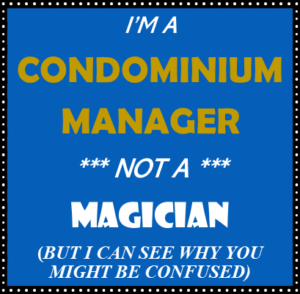 January 2024
January 2024
Individuals with a Masters of Business Administration (MBA) have received the best training for condominium management.

While many engineers, accountants, real estate agents and lawyers may disagree, no other designation offers such a broad set of general business skills directly relevant to condominium management. Their education includes operations, accounting, finance, budgeting, organizational systems, technology, communication, human resources, decision making and other basics of business management. These skills, supplemented by experience, are the foundation upon which successful businesses and condominium communities are built.
A condominium corporation is a business operation requiring the same basic skills as any other business. In business, poor management leads to business failure. In condominium living, poor management leads to a less-draconian result. Poorly managed and struggling communities continue to survive out of necessity albeit with a lower standard of living, more problems and higher costs.
Having individuals with an MBA serving as a condominium manager or condo director offers the best skillset and experience available for the community.
Training available to condominium managers and condo directors, provided through the Condominium Authority of Ontario (CAO) and Condominium Management Regulatory Authority of Ontario (CMRAO), offer a basic introduction to condominium living and management that is helpful. Much of this knowledge is already known to an MBA with or without business experience. What is not known can be learned by reading and understanding condominium governing documents including the Condo Act. Industry education and training for condominium managers is not at a comparable level to what is necessary to earn an advanced business degree.
Responsibilities and obligations of those in a leadership role within a condominium corporation is comparable to what is required in a business organization and include:
- Manage the organization in a manner representing the interests of owners while reporting to and supporting its directors
- General supervision and management of day-to-day affairs of the organization
- Develop and implement plans for maintaining, supporting and improving the organization
- Establish and meet goals identified as desirable by the organization
- Prepare and adhere to budgets
- Manage finances
- Communicate with stakeholders
- Make decisions based on the best available information
A condominium corporation outlives its current manager and directors. Continuity, or succession planning, ensures that individuals are replaced without loss of skills, knowledge or history. Individuals should be allowed and encouraged to get involved up to and including observing of board meetings.
Condominium corporations are not unique when it comes to reserve funds, reserve fund studies, condo fees, conflict of interest and the many other issues addressed among boards and within communities. All business organizations deal with similar matters which they describe using different terminology.
 Successful businesses become leaders in their field while addressing the same issues as condominium corporations. Learning from their continued success allows condominium corporations to thrive by obtaining the same necessary skills and utilizing them in an effective manner.
Successful businesses become leaders in their field while addressing the same issues as condominium corporations. Learning from their continued success allows condominium corporations to thrive by obtaining the same necessary skills and utilizing them in an effective manner.







